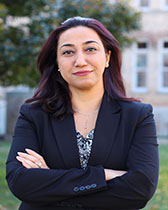Elham Hoominfar
Assistant Professor of Instruction; Co-Director, Colloquium for Global Iran Studies

- elham.hoominfar@northwestern.edu
- (847) 467-7834
- 1800 Sherman Ave., Suite 1-200, #1211
Topics of Expertise: Environmental Sociology and Environmental Justice, Hazards and Disasters, Development and Sustainability, Gender, Social Inequality, and Social Movements emphasizing political economy
Research and Teaching Interests
Environmental Sociology and Environmental Justice, Hazards and Disasters, Development and Sustainability, Gender, Social Inequality, and Social Movements
Biography
Elham Hoominfar is an assistant professor in the Global Health Studies Program at Northwestern University. Hoominfar is a critical sociologist whose research focuses on intersections of environment and society and understanding social movements with an interdisciplinary approach.
She received her bachelor's and first master's degrees in sociology from Tehran University, Iran. Her second master's degree is in the Cross-Cultural and International Education program from Bowling Green State University, Ohio. Her Ph.D. is in sociology from Utah State University.
Before she left Iran, she worked on various research and teaching projects in several institutes, including the Natural Disaster Research Institute, where she was a senior researcher, the Urban and Rural Research Institute, and the United Nations Population Fund.
Her doctoral project is a comparative study of Iranian and American environmental movements focused on water transfer projects. Hoominfar has applied theories and narratives of neoliberalism and social movements in this study. This research explains how two environmental movements in the US and Iran have framed water transfer projects as a mechanism for the marketization of water, not a development project. According to both countries' social movements, there are similarities in the commodification and the commercialization of water, but different processes, means, and mechanisms are used. Hoominfar's study highlights these differences by examining the state's role in two different contexts, a capitalist democracy (the US) and a capitalist centralized statist system (Iran). In addition, she shows why environmental movements have emerged and how they work in different political economies and use different or similar strategies and tactics.
Hoominfar’s publications in Persian and English explore social inequalities and problems caused by development projects for local communities, the impacts of environmental degradation on society, and the effects of natural disasters on marginalized groups. She also studies gender discrimination, social movements, and ethnic conflicts.
She is currently researching environmental justice, water governance, the commodification of nature, and social resistance, emphasizing political economy in the Global South and North. She is working on another study about gender discrimination and women’s movements in Iran. She is also working on a book in Persian about language and educational justice in Iran.
In addition, Hoominfar has extensive teaching experience in the United States and Iran. She employs a student-centered learning method and a critical view for teaching. She believes that pedagogy is “a critical understanding of reality.”
Global Health Courses Taught
- Environmental Justice
- Hazards, Disasters, and Society
- Qualitative Research Methods in Global Health
Selected Publications
Hoominfar, E., & Radel, C. (2023). “Frankly, My Dear, I Don’t Want a Dam” in the US or in Iran: Environmental Movements and Shared Strategies in Differing Political Economies. Social Sciences, 12(3), 161.
Hoominfar, E. (2022). The Main losers of 1979, the creators of the new revolution in Iran. Monthly Review Online, Posted Oct 12, 2022: https://mronline.org/2022/10/12/the-main-losers-of-1979-the-creators-of-the-new-revolution-in-iran/
Hoominfar, E & Zangeneh, N. 2021. “The Brick Wall to Break: Women and the Labor Market under the Hegemony of the Islamic Republic of Iran (IRI).” International Feminist Journal of Politics, (23) 2, 263-286, DOI:10.1080/14616742.2021.1898286
Hoominfar, E. 2020. “Social Movements in Iran: How well does the dominant narrative work?” Critical Sociology, 1-17. https://doi.org/10.1177%2F0896920520976792
Hoominfar, E & Radel, C. 2020. “Contested Dam Development in Iran: A Case Study of the Exercise of State Power over Local People.” Sustainability, 12, (13) 5476. https://doi.org/10.3390/su12135476
Hoominfar, E. 2019. Socialization of Women. In: Leal Filho W., Azeiteiro U., Azul, A.M., Brandli, L., Özuyar, P., Wall, T. (eds) Gender Equality. Encyclopedia of the UN Sustainable Development Goals. Springer, Cham
Hoominfar, E and Moidfar, S. 2012. Strategies to Increase Rural Participation in Village Affairs. Ghom, Iran; Motahari. (2nd Edition)
Hoominfar, E. 2003. “Change of Gender Socialization,” Women Scientific-Research Journal 3(7), 89-113.
